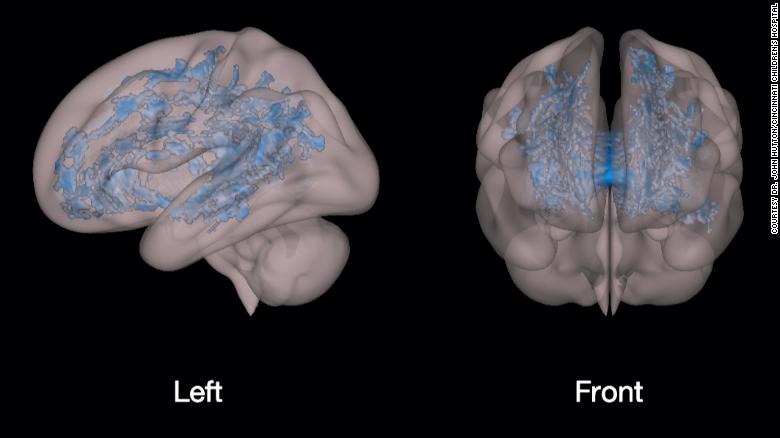- Click to share on Facebook (Opens in a new window)
- Click to share on Twitter (Opens in a new window)
- Click here to share on LinkedIn (Opens in a new window)
- Click to email a friend (Opens in a new window)
How do electronic devices affect your children? (February 2019) 1:30
(CNN) - Removing the screens and reading to our children during the formative years from birth to 5 years increases brain development. We all know that it is true, but now science can convince us with amazing images.
This is the brain of a preschooler who is often read by a caregiver.
The red areas in this exploration show a growth in organized white matter in the language and literacy areas of the child's brain, areas that will support learning in school.
The red areas show the increase in organized white matter in the language centers of the brain.
This is the brain of a preschooler who probably spends an average of two hours a day playing with screens.
The blue in this image shows the enormous underdevelopment and disorganization of white matter in the same areas necessary to support learning in school.
Blue shows the enormous underdevelopment and disorganization of white matter of a preschooler who uses screens (television, tablets, cell phones, etc.)
Both images are from recent studies conducted by the Reading and Literacy Discovery Center of the Cincinnati Children's Hospital. They are the first studies to provide neurobiological evidence of the potential benefits of reading and possible damage to screen time in the brain development of a preschooler.
"This is important because the brain is developing more rapidly in the first five years," said lead author Dr. John Hutton, a pediatrician and clinical researcher at the Cincinnati Children's Hospital.
“Children who have more stimulating experiences that organize the brain have a great advantage when they arrive at school,” said Hutton. "And it's really harder and harder for children to catch up if they get back."
Importance of white matter
Both studies used a special type of MRI, called diffusion tensor images, to examine the white matter of 47 healthy children between the ages of three and five who had not yet started kindergarten.
Gray matter in the brain contains most of the brain cells that tell the body what to do. White matter is composed of fibers, typically distributed in bundles called tracts, that form connections between brain cells and the rest of the nervous system.
The increase and organization of white matter is essential for the brain's ability to communicate through its various parts, which increases its functionality and learning capacity. Without a well-developed communication system, the processing speed of the brain slows down and learning suffers.
“Children are born with more neurons than they will have in their life, essentially a blank board,” said Hutton. "Depending on what kind of stimulation the child has with those who care for him (to talk to him, to keep him, go outside, to read him), the connections between these neurons are reinforced."
The experience thus "connects" those bonds in the brain, Hutton said. But anyone who does not use well is pruned by the brain and atrophied.
"And although the brain can change and learn at all ages, it is much more efficient in the first five years, and that is why those early childhood experiences are so important," he said.
Not only beautiful images
In addition to brain scans, children were also tested cognitively. When it came to screen time, children who used screens more than an hour a day had poorer emerging literacy skills, less ability to use expressive language, and obtained fewer qualifications in the ability to name objects quickly.
In contrast, children who frequently read books with their caregiver scored better on cognitive tests.
"We essentially found the opposite effects of time on the screen," Hutton said. "But it seems to be very localized in the type of classical language and image clues that are more directly relevant to reading."
READ : How to interest children in reading this vacation
On-screen time, on the other hand, gets in the way of more things than just reading, "like playing with toys, using imagination and going outside," said Hutton, "thus interfering with all kinds of activities that would benefit different parts of the brain that are not only related to reading. ”
What kind of reading was more important?
"What really seemed to stop, at least based on this analysis, is simply being there and doing it, reading to your son regularly," Hutton said. “And, for me, that takes a lot of pressure from parents to find the perfect book. Just keep reading in a loving and constant way. ”
How to read to your preschooler
There is no "best" way to read your child, experts say. But the research provides some advice on what may work best to involve and attract your child to love books and reading.
The National Institute of Literacy has compiled science-based suggestions that include:
1) Begin from birth by talking with your child and responding to his attempts to "talk like baby"
2) Sing the alphabet song
3) Have your child use his imagination and invent stories, and ask many questions about those invented stories
4) Choose books with interesting characters, and don't be afraid to play roles with different accents and voices for the characters
5) Have your child point to pictures and words and repeat them
6) The most important thing: have fun!
brain

